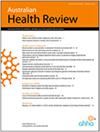Universal Oral Health Coverage: Investigating the Conditions for Implementation of the Historic WHO Resolution in Greece
IF 1.4
4区 医学
Q3 HEALTH CARE SCIENCES & SERVICES
引用次数: 0
Abstract
Oral health is an integral part of overall human health. However, the reduction of public dental funding and chronic weaknesses of the Greek Health System has exacerbated inequalities in access to dental care. In this paper, we aim to uncover the current situation in Greece, regarding the provision of dental care and detect the necessary actions for adopting the historic World Health Organisation (WHO) Resolution on Oral Health (May 2021), which mandates the universal coverage of oral health. Qualitative research was conducted, involving sixteen(16) health system experts, public health officials, as well as representatives of the wider dental community, and patients, who were invited to answer an eleven(11)-item questionnaire, through semi-structured in-depth interviews. The validity of the results was confirmed with the method of triangulation, using multiple data sources. A review of the literature and a search for statistical data in reliable databases were also performed. Low prioritization of oral health, understaffing of National Health System (NHS) dental departments, almost zero public dental funding, wide and deep inequalities, and exclusions of access to dental care were found. A National Oral Health Strategy as well as full integration of Dentistry into the Health System, the adoption of a minimum guaranteed share of public health funding dedicated to oral health, and the creation of an Observatory of Inequalities and Oral Health Policies are considered neces- sary actions for the significant improvement of the oral health status of the Greek population. The WHO Resolution on Oral Health is a call for action toward a modern, universal, effective, efficient, comprehensive, and humancentered health system that gives dental care the place it deserves. Political will, a minimum guaranteed percentage of public health funding dedicated to oral health, and a National Strategy emerge as the pillars of this imperative reform.全民口腔健康覆盖:调查在希腊实施世卫组织历史性决议的条件
口腔健康是人类整体健康不可分割的一部分。然而,公共牙科资金的减少和希腊卫生系统的长期弱点加剧了获得牙科保健的不平等。在本文中,我们旨在揭示希腊在提供牙科保健方面的现状,并为通过具有历史意义的世界卫生组织(世卫组织)口腔健康决议(2021年5月)发现必要的行动,该决议要求全民覆盖口腔健康。进行了定性研究,涉及16(16)名卫生系统专家,公共卫生官员,以及更广泛的牙科界代表和患者,他们被邀请通过半结构化的深度访谈回答11(11)项问卷。采用多数据源的三角剖分方法验证了结果的有效性。还对文献进行了回顾,并在可靠的数据库中搜索统计数据。口腔卫生的优先级低,国家卫生系统(NHS)牙科部门人员不足,公共牙科资金几乎为零,广泛而深刻的不平等,以及排除获得牙科保健的机会。一项国家口腔健康战略以及将牙科全面纳入卫生系统,采用最低限度的公共卫生资金份额用于口腔健康,以及建立不平等和口腔健康政策观察站被认为是显著改善希腊人口口腔健康状况的必要行动。世卫组织关于口腔卫生的决议呼吁采取行动,建立现代、普遍、有效、高效、全面和以人为本的卫生系统,使牙科保健得到应有的重视。政治意愿、保证用于口腔健康的公共卫生资金的最低比例以及一项国家战略成为这一势在必行的改革的支柱。
本文章由计算机程序翻译,如有差异,请以英文原文为准。
求助全文
约1分钟内获得全文
求助全文
来源期刊

Australian Health Review
医学-卫生保健
CiteScore
2.90
自引率
5.60%
发文量
134
审稿时长
6-12 weeks
期刊介绍:
Australian Health Review is an international, peer-reviewed journal that publishes contributions on all aspects of health policy, management and governance; healthcare delivery systems; workforce; health financing; and other matters of interest to those working in health care. In addition to analyses and commentary, the journal publishes original research from practitioners – managers and clinicians – and reports of breakthrough projects that demonstrate better ways of delivering care. Australian Health Review explores major national and international health issues and questions, enabling health professionals to keep their fingers on the pulse of the nation’s health decisions and to know what the most influential commentators and decision makers are thinking.
Australian Health Review is a valuable resource for managers, policy makers and clinical staff in health organisations, including government departments, hospitals, community centres and aged-care facilities, as well as anyone with an interest in the health industry.
Australian Health Review is published by CSIRO Publishing on behalf of the Australian Healthcare and Hospitals Association.
 求助内容:
求助内容: 应助结果提醒方式:
应助结果提醒方式:


